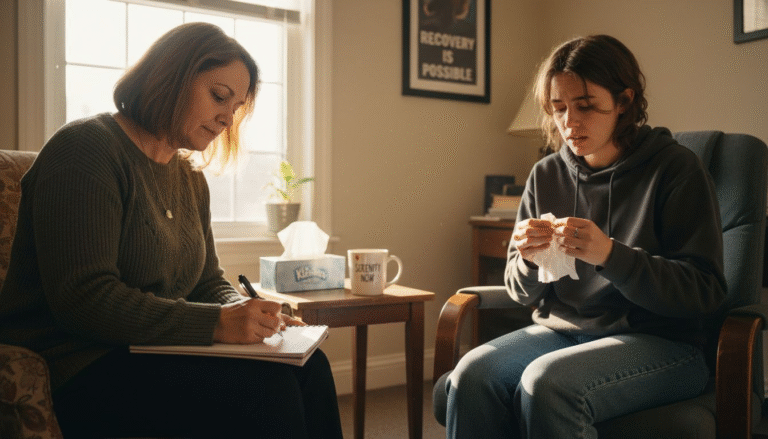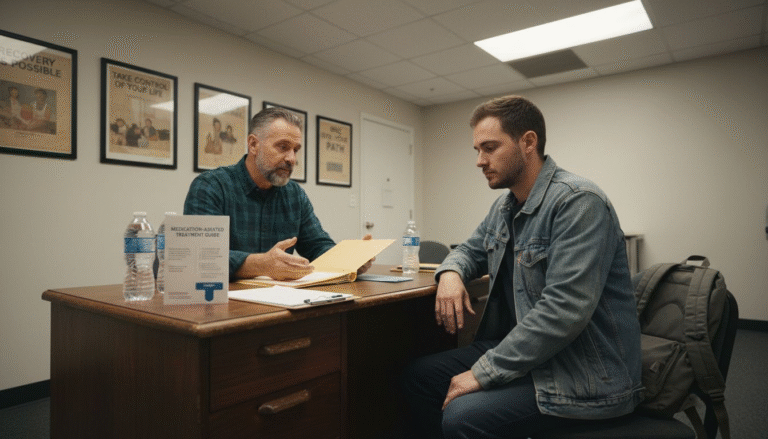In overcoming addiction, shame can be one of our worst enemies. Shame can be why you are reluctant to enroll in a rehabilitation program or ask your loved ones for help. Shame can stem from facing the reality of your problem or others finding out about your struggles, but it is impossible to begin your healing without admitting that you have a problem and then seeking help for addiction.
End the Shame of Addiction
Shame is powerful. Shame talks over us and convinces us to be quiet. It is vital to address the feeling of shame as it occurs because if we allow shame to speak over us, the cycle will start all over again. While it is a normal response, failure to acknowledge shame can cause your addiction to worsen.
How society views addiction plays a prominent role in how we confront it. Addiction is often seen as a personal failure. A failure on the part of the individual who supposedly did not try hard enough. This could not be more wrong. Addiction is a chronic illness, and it should be treated as one.
Seeking Help for Addiction Is the Hard Part
Contrary to popular belief, seeking help for addiction shows unimaginable courage. It is not unlikely that someone with an addiction will think seeking help for addiction makes them seem weak, but that cannot be further from the truth. When you reach out to someone to deal with your alcohol or drug problem, we recognize that it takes great courage.
The important thing to remember when seeking help for addiction is that you are no longer alone. Finding someone who has been through recovery or someone you feel safe opening up to can make the process a little easier. Be honest with yourself about why you want this change, and be willing to accept support.
How to Ask for Help
Acknowledging that you need help is a massive step towards your recovery. We realize the strength it must have taken to face this reality and overcome any shame or fear you may have been feeling. So, what’s next?
For some people, seeking help for addiction may look like confiding in a close friend or family member. If you decide to turn to family or friends, you may anticipate a variety of different reactions. The thought of the person you choose to ask for help reacting negatively can impact how long you wait to reach out. However, you will know how others will respond once you actually do it. Of course, there is a chance that they respond negatively, but there is also the possibility of them surprising you and responding in a way that helps you feel safe. To help ease the anxiety, you can first try to rehearse what you will say. Take the time to find the right words that accurately describe your feelings, and you may be relieved to discover that your loved ones are still there for you.
When you are ready, another person that you can ask for help is your primary care physician. If you have a primary care physician, you might be able to ask them about getting substance abuse treatment. They can also help you connect with a psychiatrist or an addiction specialist. After getting an appointment, your specialist can answer any questions you may have about how to begin your journey to become sober. Your questions may look like this:
- How can I cut back on my substance use?
- What treatments are available for me?
- How can I get help while I am in recovery?
Others may not have much support, and we recognize them too. The SAMHSA National Helpline is a 24-hour, 365-day confidential information service that provides treatment referrals to individuals facing mental and/or substance use problems. While this hotline may not provide counseling, trained specialists can connect you with a treatment facility in your area.
How Can You Offer Help?
If you have not personally experienced an addiction, you may not understand it when someone comes to you for help. One of the best ways to offer support is to educate yourself on addiction. Taking the time to learn about and understand the addiction your loved one is experiencing can allow you to process what you can do to help. It took a lot of strength for your loved one to ask for help, so here are some things you should not do if you find yourself in this situation:
- Do not belittle or demean them: Avoid language that implies shame. For example, do not use phrases like “You’re smarter than this” or “I never expected this from you.”
- Do not resort to name-calling: Avoid using derogatory terms like “cokehead.”
Instead, attempt to validate your loved one by using phrases like:
- “I am here to support you.”
- “Thank you for sharing what you are going through with me.”
If you become worried that a friend or loved one with an addiction is backsliding, address it as soon as possible. Do your best to provide a space where they can speak openly and feel accepted. Remind them you are there to help and offer lots of support and encouragement. Sometimes, your loved one won’t want to accept your help. Do not give up on them and do not respond in anger. Show them that you are not being judgemental and that you just want to help. Continue to offer positive encouragement and refrain from using guilt.
Unfortunately, controlling addiction is not easy. Do not forget that it can be difficult for someone to confront their addiction. Let alone share it with others. So join the effort to remove the shame of seeking help for addiction.
Glendora Recovery Center in Glendora, CA, Can Help You
Struggling with addiction can be incredibly difficult. We understand the courage it takes to ask for help. Glendora Recovery Center is dedicated to helping our patients overcome their addictions and regain control of their lives. Give us a call at (626) 594-0881 to get started on your recovery journey.



